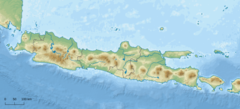An earthquake affected the island of Java, Indonesia on 22 January 1780. The source and magnitude of the earthquake remains debated among seismologists. Proposed origins of the earthquake include shallow inland back-arc thrusting along a fault located within the upper crust on the island or rupture of the subduction zone off the southern coast of Java. The magnitude of the earthquake is estimated to be at least 8.5, while other sources usually refer to it with a range of Mw 8.0 to 8.5 for the megathrust earthquake.[1] For the shallow crustal earthquake source, the magnitude range is Mw 7.0 to 8.0.
| Local date | 22 January 1780 |
|---|---|
| Magnitude | 7.0-8.5 Mw |
| Epicenter | 8°36′00″S 105°30′00″E / 8.600°S 105.500°E Java, Dutch East Indies |
| Fault | Java Trench or a shallow crustal fault, possibly the Baribis Fault |
| Type | Shallow crustal or megathrust |
| Areas affected | Java |
| Max. intensity | MMI VIII (Severe) |
| Casualties | Unknown |
Tectonic setting
editThe Java subduction zone has not had any large-magnitude earthquakes in the past 100 to 200 years except for an M8.0–8.5 Java Trench earthquake in 1780, which was the largest historical earthquake in the Java Trench. Recent large earthquakes in other subduction zones have cast doubt on the notion that long-term fault behavior can be inferred by as little as one century of historical earthquake records. The total convergence rate across the Java Trench is about 6 to 7 cm a year, higher than most other major subduction zones in the region.[2]
Earthquake
editThe earthquake occurred in the Sunda Strait segment of the Java Trench. The magnitude of the earthquake was estimated at Mw 8.5, although some experts provided a range of Mw 8.0–8.5.[3]
However, seismologists also attribute the earthquake to shallow crustal faulting associated with a back-arc thrust fault running along the island. The Barbiris Fault which runs east–west south of Batavia (present-day Jakarta) may have been the source of the earthquake, with a magnitude of 7.0 to 8.0. Another Mw 7.0–7.7 earthquake occurred in 1834 along the fault. These conclusions came after running simulations of earthquake shaking based on damage and ground shaking reports from historical documents.[4]
Damage
editThe earthquake toppled buildings in Bogor, Banten and Batavia. Damage in Batavia was assigned VIII (Severe) on the Modified Mercalli intensity scale. Twenty-seven warehouses collapsed in the city due to the shaking. No information about the casualties due to limited historical records.[5] An observatory in the city 24 meters high which was built in 1765 was badly damaged and abandoned after the earthquake.[6] The earthquake may have triggered an increase in volcanic activity at Mount Salak and Pangrango.[7]
Future hazard
editThe Sunda Strait segment has the potential to trigger a large earthquake with a magnitude of 8.7 or higher. Prolonged inactivity in this section and the lack of historical record that might indicate any major subduction-type earthquakes signals the potential of a megathrust event in the Sunda Strait that can affect southern West Java and Sumatra. If the Sunda Strait, Enggano, and West-Central Java megathrust segments rupture at the same time, the magnitude can exceed 9.0.[8] The Sunda Strait segment has a high risk of tsunami probability; seismic activity on this segment can cause a major tsunami.[9]
See also
editReferences
edit- ^ "1780 Java Earthquake". risklayer-explorer. Retrieved 19 March 2023.
- ^ "Java Subduction Zone Earthquake: The Worst Is Yet to Come?". air-worldwide. 23 May 2016. Retrieved 19 March 2023.
- ^ Aditya, Rifan (18 January 2022). "Sejarah Gempa Megathrust dan Tsunami di Selatan Jawa, Sudah Terjadi Sejak 1780 dari Banyuwangi hingga Jawa Barat". Suara. Retrieved 19 March 2023.
- ^ Widiyantoro, S.; Supendi, P.; Ardianto, A.; Baskara, A. W.; Bacon, C. A.; Damanik, R.; Rawlinson, N.; Gunawan, E.; Sahara, D. P.; Zulfakriza, Z.; Husni, Y. M.; Lesmana, A. (2022). "Implications for fault locking south of Jakarta from an investigation of seismic activity along the Baribis fault, northwestern Java, Indonesia". Scientific Reports. 12 (10143): 10143. Bibcode:2022NatSR..1210143W. doi:10.1038/s41598-022-13896-6. PMC 9203524. PMID 35710692.
- ^ "Indonesia's Historical Earthquakes Modelled examples for improving the national hazard map". ResearchGate. January 2015. Retrieved 19 March 2023.
- ^ "Jejak Gempa DKI: Hancurkan Istana Daendels; Lenyapkan Observatorium Megah". Kumparan.com. 26 February 2023. Retrieved 19 March 2023.
- ^ "4 Gempa di Jakarta Terbesar Sepanjang Sejarah, Terakhir Sebabkan 27 Orang Terluka". Sindonews. 22 November 2022. Retrieved 19 March 2023.
- ^ "Sunda Strait megathrust segment may trigger 8.7-M quake: BRIN". Antaranews.com. 18 January 2022. Retrieved 19 March 2023.
- ^ "Determination of tsunami run-up and golden time in the megathrust subduction zone of the sunda strait segment". 2021. Retrieved 19 March 2023.

